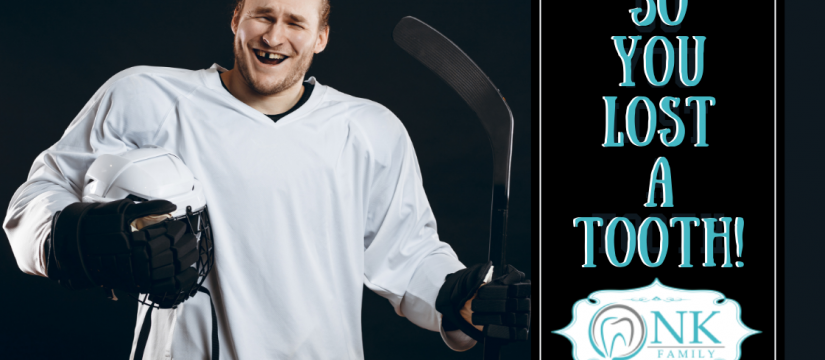
Losing a permanent tooth as the result of an accident is a traumatic event, yet one that dentists are experienced in dealing with should this happen to you. Whatever the cause – car accident, sports injury, or fall – there can be a good chance of having the tooth successfully reimplanted if the circumstances are right, the tooth has been properly handled and you reach the dentist in time. Keep reading to learn what you should do immediately following tooth loss, why you need to act fast and your treatment options.
What to do Immediately After a Tooth Loss
Keeping a clear head after losing a tooth can be difficult, but essential. Locate the tooth, pick it up at the crown and rinse it off with a saline solution, milk or saliva. Do not scrub it, or you may lose vital tissue. Very gently reinsert the tooth into the socket, and hold it in place. If this is not possible, put the tooth in your mouth between the gum and cheek. As a last resort, you can place it in a clean cup with water or milk. Immediately go to the nearest dentist. If possible, call the office while on the way so the dentist will be prepared to treat the trauma as soon as you arrive. The moment a tooth is knocked out, a clock starts ticking. If the tooth is not re-implanted quickly, preferably within 30 minutes, your chance of losing it permanently is significant.
Why You Need to Act Fast
The medical term for a tooth lost as the result of a serious blow to the face is an avulsed tooth, and it is always considered an emergency. If it is not treated as soon as possible, you can lose the tooth and end up with a badly infected socket. Should the dentist be able to reimplant the tooth, it will be reinserted into the socket and splinted to the adjacent teeth to keep it from moving. In some cases, the dentist will perform an immediate root canal to remove the nerve of the tooth and replace it with plastic material so as to prevent infection and further dental procedures.
If the facial trauma results in a loose tooth, you still need to see your dentist as soon as possible to learn if it can be saved. Again, treatment for a tooth loosened by trauma (as opposed to gum disease) may require splinting.
If the Tooth Can Not Be Saved
Because of the time factor, the type of trauma experienced or improper handling, there are many cases in which a tooth can not be saved. When this occurs, the empty socket must be filled with an implant. Without it, not only can the socket become infected, but other teeth can deteriorate, as well as the jawbone. This is the best long-term solution to restore function, appearance and preserve the surrounding teeth and jaw. Read our Sept. 19, 2018 blog post to learn what to expect during a dental implant procedure.
Prevention is Best
Accidents by their very nature are unpredictable, but some injuries that result in tooth loss can be prevented. Be sure that you – and/or your child – wear the appropriate protection when playing sports. Athletic mouth guards are very comfortable to wear, and can mean the difference between suffering a catastrophic oral injury and getting right back into the game. At NK Family Dental, we are proud to offer mouth guards custom-made for both adults and children.
Know Your Treatment Options
Should an avulsed tooth be impossible to save, NK Family Dental offers dental implant options that provide outstanding performance, function and aesthetics. In addition to traditional implants, we provide the popular All-On-Four implants and Teeth-in-a-Day. If you would like to learn more, or schedule an appointment to see if you are a candidate, contact us today!
